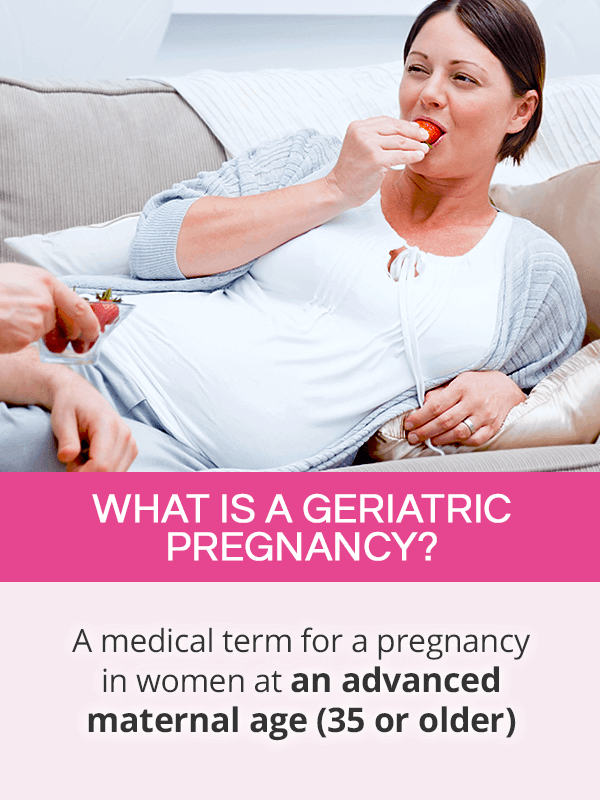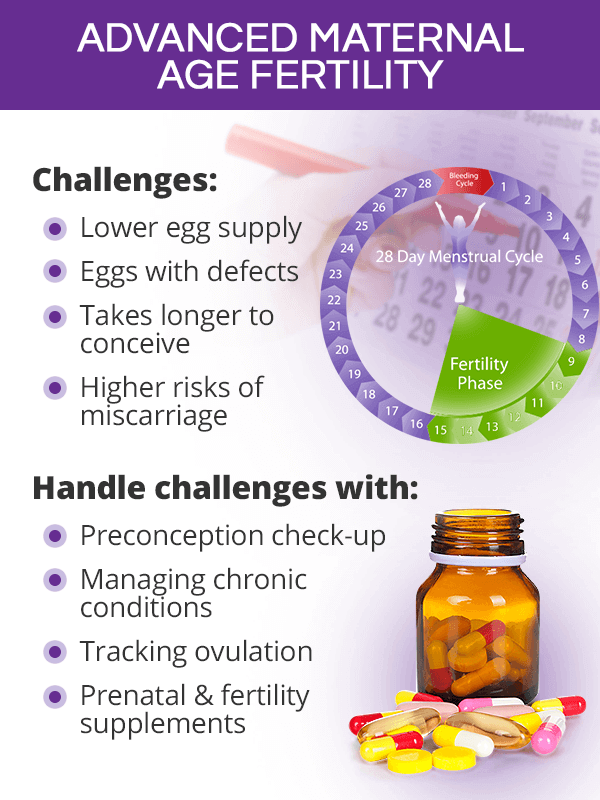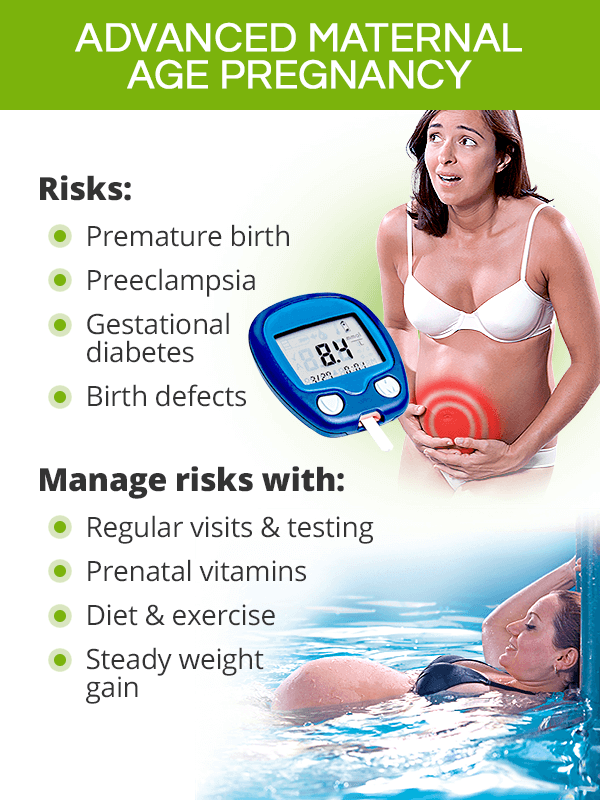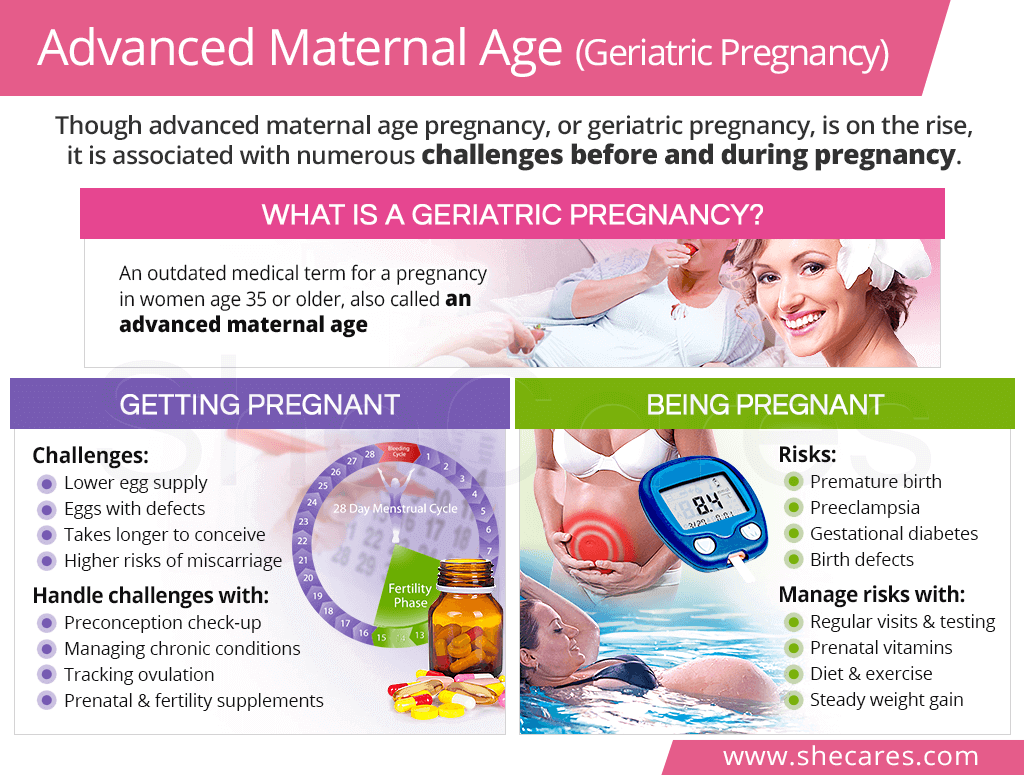What is a Geriatric Pregnancy?

A geriatric pregnancy is a medical term for a pregnancy in women age 35 or older at the time of delivery.
Although the term “geriatric,” which relates to the elderly population, seems strongly outdated considering that more and more women get pregnant in their mid-30s or 40s, in the medical world, the age of 35 is still considered an advanced maternal age.2
Advanced maternal age is widely linked to certain challenges and health risks both before and during pregnancy, the most important of which are discussed in the following sections.
Advanced Maternal Age Fertility

Approaching the category of advanced maternal age, which means around age 35, is when many women start experiencing their first fertility and age-related problems.
Fertility at Advanced Maternal Age
Awoman's ability to get pregnant naturally mainly depends on her ovarian reserve, which is the capacity of her ovaries to provide viable eggs that can be released on ovulation, fertilized by sperm, and develop to full term.
A natural, age-related decline in fertility is due to two factors:
Egg quantity declines at faster rates after 35, and
Egg quality decreases as there are more chromosomal changes in the eggs that are still in the ovaries, making many of them unviable for fertilization.
As a result, women in their mid-30s and 40s typically take longer to get pregnant naturally, have higher rates of miscarriage, and are more likely to have a child with genetic conditions, like Down syndrome.3
Planning an Advanced Age Pregnancy
Although challenging, an advanced maternal age pregnancy is far from impossible. Proper preconception planning is key to improving the odds of conception and enjoying a healthy pregnancy. It may include the following steps:
Scheduling a preconception check-up to manage existing conditions
Learning to detect one's ovulation and fertility window
Starting prenatal vitamins at least a month before conceiving
Taking fertility supplements, like Macafem for Conceiving, at least three months before conceiving
Women 35 and older are also instructed to seek fertility help sooner than younger women, namely after six months of unsuccessful trying. Because of the upcoming onset of perimenopause, most women in their mid-40s are unable to conceive naturally and have to rely on assisted reproductive technologies (ARTs), like in vitro fertilization (IVF).
Advanced Maternal Age Pregnancy

A geriatric pregnancy has an increased risk of pregnancy complications mainly because older women are more likely to have pre-existing conditions, like high blood pressure or diabetes, which might bring additional challenges.
Advanced Maternal Age Risks during Pregnancy
Numerous studies have shown the link between advanced maternal age and adverse pregnancy outcomes, including:4,5,6,7
- Premature birth
- Preeclampsia
- Gestational diabetes
- Cesarean section
- Miscarriage
- Stillbirth
- Birth defects
Carrying twins or triplets at an advanced maternal age carries additional risks and challenges. As such, babies born to older women are at higher odds of requiring neonatal intensive care.
How to Have a Safe Advanced Maternal Age Pregnancy
Fortunately, medical advances and more thorough prenatal care given to geriatric mothers enable the doctors to manage the risks associated with advanced maternal age pregnancies well. The following recommendations are some of the best ways to have a healthy pregnancy, especially after the age of 35:
- Eating a well-balanced and nutritious pregnancy diet
- Keeping regular prenatal visits and undergoing recommended prenatal testing
- Gaining pregnancy weight in a steady and healthy way
- Maintaining low- to moderate-level exercise during pregnancy (unless otherwise instructed by a doctor)
- Implementing stress-relief techniques while pregnant on a daily basis
- Having a support network for reassurance
Key Takeaways
Odds are that women in their mid-30s or older preparing to get pregnant are already well-informed about the challenges and risks they might be facing. Nevertheless, women decide to become mothers at a more advanced age year after year. This delay in motherhood involves certain risks that affect both their ability to get pregnant and have a healthy pregnancy. Consequently, women age 35 and older typically take longer to conceive naturally since their ovaries have a decreased egg supply, and the majority have chromosomal abnormalities that can compromise their efforts. They are also at a higher risk of having a child with genetic conditions, such as Down syndrome. Because older women are also more likely to have pre-existing health conditions, they have greater odds of suffering from complications during pregnancy, such as preterm birth or preeclampsia. Fortunately, in most cases, risks involved in geriatric pregnancy are manageable, and with proper care, older women can enjoy a happy and healthy motherhood.
Sources
- American Journal of Physiology. (2019). Advanced maternal age and the impact on maternal and offspring cardiovascular health. Retrieved September 18, 2019 from https://www.physiology.org/doi/abs/10.1152/ajpheart.00045.2019?journalCode=ajpheart
- BJOG. (2001). Can obstetric complications explain the high levels of obstetric interventions and maternity service use among older women? A retrospective analysis of routinely collected data. Retrieved September 18, 2019 from https://www.ncbi.nlm.nih.gov/pubmed/11563459
- BMC Pregnancy and Childbirth. (2012). Advanced maternal age and risk perception: A qualitative study. Retrieved September 18, 2019 from https://www.ncbi.nlm.nih.gov/pmc/articles/PMC3490979/
- Fertility and Sterility. (2015). Reproduction at an advanced age and maternal health. Retrieved September 18, 2019 from https://www.fertstert.org/article/S0015-0282(15)00203-4/fulltext
- Global Health: Science and Practice. (2018). High-risk Advanced Maternal Age and High Parity Pregnancy: Tackling a Neglected Need through Formative Research and Action. Retrieved September 18, 2019 from https://www.ncbi.nlm.nih.gov/pmc/articles/PMC6024617/
- Human Reproduction. (2002). Changes with age in the level and duration of fertility in the menstrual cycle. Retrieved September 18, 2019 from https://www.ncbi.nlm.nih.gov/pubmed/11980771
- March of Dimes. (2016). Pregnancy after age 35. Retrieved September 18, 2019 from https://www.marchofdimes.org/complications/pregnancy-after-age-35.aspx
- Obstetrics and Gynecology. (2005). Impact of maternal age on obstetric outcome. Retrieved September 18, 2019 from https://www.ncbi.nlm.nih.gov/pubmed/15863534
Footnotes:
- CDC. (2018). National Vital Statistics Reports. Births: Final Date for 2017. Retrieved September 19, 2019 from https://www.cdc.gov/nchs/data/nvsr/nvsr67/nvsr67_08-508.pdf
- BMC Pregnancy and Childbirth. (2018). The effect of advanced maternal age on perinatal outcomes in nulliparous singleton pregnancies. Retrieved September 18, 2019 from https://www.ncbi.nlm.nih.gov/pmc/articles/PMC6106883/
- Fertility and Sterility. (2014). Female age-related fertility decline. Retrieved September 18, 2019 from https://www.fertstert.org/article/S0015-0282(13)03464-X/pdf
- Mayo Clinic. (2017). Pregnancy after 35: Healthy moms, healthy babies. Retrieved September 18, 2019 from https://www.mayoclinic.org/healthy-lifestyle/getting-pregnant/in-depth/pregnancy/art-20045756
- Maternal and Child Health Journal. (2015). Maternal age and risk of labor and delivery complications. Retrieved September 18, 2019 from https://www.ncbi.nlm.nih.gov/pmc/articles/PMC4418963/
- The Open Nursing Journal. (2009). A Review of Pregnancy in Women Over 35 Years of Age. Retrieved September 18, 2019 from https://www.ncbi.nlm.nih.gov/pmc/articles/PMC2729989/
- Obstetrics and Gynecology. (2005). The perinatal effects of delayed childbearing. Retrieved September 18, 2019 from https://www.ncbi.nlm.nih.gov/pubmed/15932837
